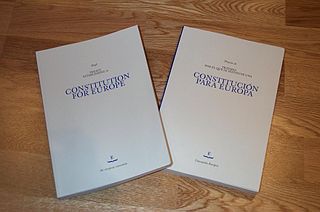
The Treaty of Nice was signed by European leaders on 26 February 2001 and came into force on 1 February 2003.

The Treaty establishing a Constitution for Europe was an unratified international treaty intended to create a consolidated constitution for the European Union (EU). It would have replaced the existing European Union treaties with a single text, given legal force to the Charter of Fundamental Rights, and expanded qualified majority voting into policy areas which had previously been decided by unanimity among member states.

A referendum was expected to take place in the United Kingdom in 2006 to decide whether the country should ratify the proposed Treaty establishing a Constitution for Europe. However, following the rejection of the Constitution by similar referendums in France in May 2005 and the Netherlands in June 2005, the UK vote was postponed indefinitely. The question was thought to have been settled when the constitution was superseded by the Treaty of Lisbon, which Parliament ratified in 2008 without holding a referendum.
The Third Amendment of the Constitution Act 1972 is an amendment to the Constitution of Ireland that permitted the State to join the European Communities, which would later become the European Union, and provided that European Community law would take precedence over the constitution. It was approved by referendum on 10 May 1972, and signed into law by the President of Ireland Éamon de Valera on 8 June of the same year.

France is a unitary semi-presidential republic with a bicameral legislature. Public officials in the legislative and executive branches are either elected by the citizens or appointed by elected officials. Referendums may also be called to consult the French citizenry directly on a particular question, especially one which concerns amendment to the Constitution.

This is a list of referendums related to the European Union, or referendums related to the European Communities, which were predecessors of the European Union. Since 1972, a total of 48 referendums have been held by EU member states, candidate states, and their territories, with several additional referendums held in countries outside the EU. The referendums have been held most commonly on the subject of whether to become a member of European Union as part of the accession process, although the EU does not require any candidate country to hold a referendum to approve membership or as part of treaty ratification. Other EU-related referendums have been held on the adoption of the euro and on participation in other EU-related policies.

A consultative referendum on the Treaty establishing a Constitution for Europe was held in the Netherlands on 1 June 2005 to decide whether the government should ratify the proposed Constitution of the European Union. The result was a "No" vote.
The Czech referendum on the Treaty establishing a Constitution for Europe was expected to take place in 2006 to decide whether the Czech Republic should ratify the proposed Constitution of the European Union. Following the rejection of the Constitution by voters in France and the Netherlands, the Czech government announced that the proposed referendum would not be held.

The Luxembourgish referendum on the Treaty establishing a Constitution for Europe is a referendum that was held on 10 July 2005 to decide whether Luxembourg should ratify the proposed Constitution of the European Union.

The French referendum on the Treaty establishing a Constitution for Europe was held on 29 May 2005 to decide whether France should ratify the proposed Constitution of the European Union. The result was a victory for the "No" campaign, with 55% of voters rejecting the treaty on a turnout of 69%.
The Irish referendum on the Treaty establishing a Constitution for Europe was a vote that was planned but did not occur. The referendum was expected to take place in 2005 or 2006 to decide whether Ireland should ratify the proposed EU Constitution. Following the rejection of the Constitution by voters in the French referendum of May 2005 and the Dutch referendum of June 2005, the planned Irish referendum was postponed indefinitely.

A referendum on the sale of the Danish West Indian Islands to the United States of America was held in Denmark on 14 December 1916. The non-binding referendum saw 283,670 vote in favor of the sale of the Danish West Indian Islands and 158,157 against. The residents of the islands were not allowed to vote on the matter, but in an unofficial vote on Saint Croix arranged by David Hamilton Jackson, 4,027 voted in favor of the sale and only seven voted against. As a result of the referendum the islands were formally relinquished to the United States by the Treaty of the Danish West Indies on 31 March 1917 as the United States Virgin Islands for a sum of US$25,000,000 in gold.

Denmark holds opt-outs from European Union policies in relation to police and justice and the adoption of the euro. They were secured under the Edinburgh Agreement in 1992 after a referendum for the ratification of the Maastricht Treaty was rejected by Danish voters, as a package of measure to assuage concerns raised during that referendum.

A referendum on changing the Danish Act of Succession, the rules governing the succession to the Danish throne, was held in Denmark, the Faroe Islands, and Greenland on 7 June 2009, simultaneously with the election to the European Parliament, in Denmark proper.

The Twenty-eighth Amendment of the Constitution Bill 2008 was a proposed amendment to the Constitution of Ireland that was put to a referendum in 2008. The purpose of the proposed amendment was to allow the state to ratify the Treaty of Lisbon of the European Union.

The Twenty-eighth Amendment of the Constitution Act 2009 is an amendment of the Constitution of Ireland which permitted the state to ratify the Treaty of Lisbon of the European Union. It was approved by referendum on 2 October 2009.

The ratification of the Treaty of Lisbon was officially completed by all member states of the European Union on 13 November 2009 when the Czech Republic deposited its instrument of ratification with the Italian government. The Lisbon Treaty came into force on the first day of the month following the deposition of the last instrument of ratification with the government of Italy, which was 1 December 2009.

The Treaty of Accession 1972 was the international agreement which provided for the accession of Denmark, Ireland, Norway and the United Kingdom to the European Communities. Norway did not ratify the treaty after it was rejected in a referendum held in September 1972. The treaty was ratified by Denmark, Ireland and the United Kingdom who became EC member states on 1 January 1973 when the treaty entered into force. The treaty remains an integral part of the constitutional basis of the European Union.
A referendum is a direct vote in which an entire electorate is asked to either accept or reject a particular proposal. This article summarises referendum laws and practice in various countries.

A referendum on joining the Unified Patent Court was held in Denmark on 25 May 2014 alongside European Parliament elections. The referendum was approved with 62.5% of the vote, enabling the government to proceed with the ratification of the Agreement on a Unified Patent Court, which constitutes the legal basis for the Unified Patent Court. The court is from 1 June 2023 to be common to 17 Member States of the European Union for proceedings regarding European patents. Ratification of the agreement, which had already been approved by a simple majority of the Danish parliament, also renders the unitary patent applicable in Denmark.












